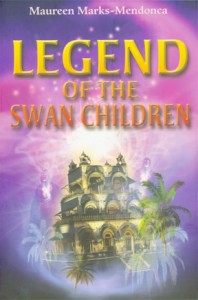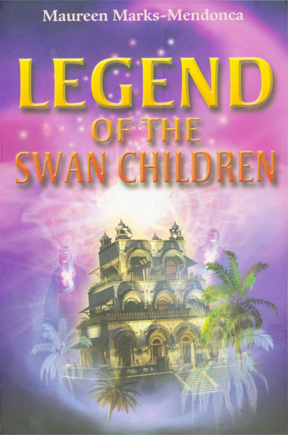She resides in Canada but speaks little about her adopted home. She prefers, it appears, to reflect on the time when she ran the local Road To Success workshops for early school leavers here in Guyana. “That project,” she says, “was about trying to show young people a different way of approaching life so that they can be the best possible people that they want to be.”
In her “present life” she is “an author.” Legend of The Swan Children is a considerable achievement in pursuit of the recruitment of fantasy to add value to reality.
She has not always been “and author.” There are, she says, “other lives.” She is a former Bank of Guyana employee turned diplomat – turned stockbroker – turned traveler in Asia, Europe, North America and more-or-less wherever she felt inclined to go. Perhaps because of her experience at the Guyana Embassy in Beijing – as a Second Secretary and sometimes as Charge D’Affairs Her life, up until now, has reflected a refined understanding of the concept of the Global Village. Home, for Maureen, has really been wherever she has made it.
 Legend of The Swan Children is one of half a dozen books in the prestigious Macmillan Island Fiction Series. The book is full of colour and fantasy and Maureen says that it targets “tweens and teens.” That, she says, is her favourite age group. “I love that age group because they are the ones that I have the capacity to reach, I was there too. I was like them at one point.”
Legend of The Swan Children is one of half a dozen books in the prestigious Macmillan Island Fiction Series. The book is full of colour and fantasy and Maureen says that it targets “tweens and teens.” That, she says, is her favourite age group. “I love that age group because they are the ones that I have the capacity to reach, I was there too. I was like them at one point.”
She does not allow you to forget the umbilical connection between her book and her passion for young people. “Everything that I do, including my writing, is really geared to say to the children that they should reach for the stars, that nothing is impossible.”
The contemporary author is a far cry from the former diplomat, These days, she is much more preoccupied with the challenges associated with giving guidance to children, challenges which she says have become far more formidable in contemporary Guyana.
The challenges confronting “tweens and teens” Those challenges have touched a responsive chord in Maureen and after I had learnt so much about her proclivity for travel I was surprised to learn that herself and her husband, Roy, are contemplating, perhaps even planning remigration.
Her immediate objective, however, is to use her first work of fiction to help re-ignite a culture of reading among young Guyanese as part of the rehabilitative mission that she envisages.
During her stay here this time around, she is seeking to place the book in schools and to have it embraced by reading programmes. It is not the first time in recent months that a Guyanese writer or publisher has broached the subject of restoring the reading habit in Guyana; and after the promises of the Carifesta season to promote the culture of reading more aggressively, you hope that the opportunity afforded by the emergence of a new Guyanese writer does not go unnoticed in an education system that ‘bellyaches’ so frequently about reading deficiencies in local schools or in a private sector which, frankly, must do much more to extend its highly touted corporate conscience to help bolster a flagging national literacy programme.
Rather than await the materialization of those imponderables, however, Maureen plans to visit schools in the hope that her book will become part of the children’s supplementary reading and even of substantive reading programmes
Maureen says that her programmes for children are “structured according to their specific needs.” Many of them, she says, “suffer from the same deficiencies; “lack of self-esteem, confusion about their places in the world and what they were meant to be.” She worries about the number of school dropouts, a function of what she believes are, in large measure, “dysfunctional homes” or, perhaps, “problems which their teachers do not quite understand how to accommodate.”
The challenges, since 1997 when she ran her own programme here, are greater. “It’s a lot more difficult now for children to see how they could get out from where they are.” It is this dilemma, she says, “that makes it even more important that we work with the children.”
The advent of The Macmillan Island Fiction series represents an attempt by the internationally famous publishers to venture into a genre of writing that departs from its customary preoccupation with academic publications, and Maureen says that she is aware that some individuals have likened the Island Fiction series to the hugely popular and internationally renowned Harry Potter series. “Some people did express the view that the Island Fiction series might be the Caribbean equivalent of the Harry Potter series.
“I wouldn’t say that we necessarily take the same kind of approach, but it certainly is fantasy fiction along the lines of the Harry Potter series.”







